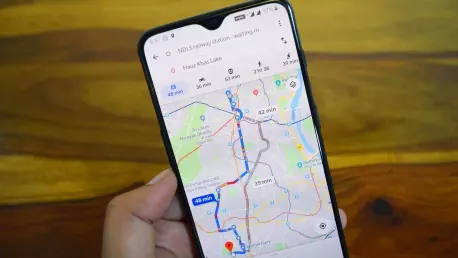Google Maps recently introduced significant enhancements aimed at revolutionizing the driving experience, incorporating advanced features and integrating its AI Gemini. As of October 31, Google Maps now includes an “Add stops” button, making it easier for users to plan their routes with stops at restaurants, gas stations, and other essential points of interest. This update signifies Google’s commitment to improving the user experience by making navigation more intuitive and personalized. Furthermore, starting in November, users in approximately thirty major cities will benefit from more detailed map displays that include lanes, pedestrian crossings, and signs. This enhancement includes a blue line that indicates the correct lane for maneuvers, guiding users to nearby parking areas and even walking them to building entrances using augmented reality.
The standout feature in this update is the introduction of Gemini, Google’s conversational AI, designed to provide users with personalized recommendations through natural language queries. With Gemini, users can ask for tailored suggestions like “quiet bar with friends this evening,” and receive results based on user reviews and preferences. This AI-driven feature not only suggests trending spots but also answers specific questions about recommended places, offering quick summaries of reviews that highlight key attributes and the overall atmosphere. Currently available in the United States on both Android and iOS, Gemini is expected to roll out to a broader audience soon. By incorporating AI capabilities, Google Maps aims to make finding and deciding on destinations more interactive and aligned with user preferences.
Enhanced Navigation and Immersive Views
Additionally, Google is expanding its immersive 3D view, which combines satellite images and Street View, to cover 150 cities. This immersive view allows users to explore areas in more detail, providing a comprehensive understanding of the location before they arrive. Moreover, Waze, Google’s other mapping service, is testing voice-activated incident reporting, allowing users to report traffic incidents without having to manually input information. These updates are part of Google’s broader strategy to stay ahead in the competitive mapping sector, leveraging innovative technologies to enhance the user experience.
The updates to Google Maps are not merely incremental improvements but are designed to fundamentally change how users interact with and rely on mapping services. By providing more detailed navigation instructions, users can drive with greater confidence and accuracy. The innovative use of augmented reality for guiding users to building entrances is particularly valuable in complex urban environments where navigating the final stretch to a destination can often be challenging. These enhancements aim to make navigation as seamless and stress-free as possible, demonstrating Google’s commitment to continually refining its service.
The Future of Digital Navigation
Google Maps has recently unveiled major updates aimed at transforming the driving experience by integrating advanced features and its AI Gemini. Released on October 31, the new “Add stops” button simplifies route planning, allowing users to schedule stops at restaurants, gas stations, and other key points of interest. This reflects Google’s dedication to enhancing user experience with more intuitive and personalized navigation.
Starting in November, users in around thirty major cities will notice more detailed maps, featuring lanes, pedestrian crossings, and signs. The update also includes a blue line to indicate the correct lane for maneuvers, guides to nearby parking, and augmented reality to help users navigate to building entrances.
A standout feature of this update is Gemini, Google’s conversational AI. Gemini offers personalized recommendations through natural language queries. Users can request suggestions like “quiet bar with friends this evening” and get results based on reviews and preferences. This AI-driven tool provides quick summaries of reviews, highlighting key attributes and overall atmosphere. Currently available in the U.S. on Android and iOS, Gemini is expected to reach a wider audience soon. By leveraging AI, Google Maps aims to make finding and deciding on destinations more interactive and tailored to individual user preferences.









